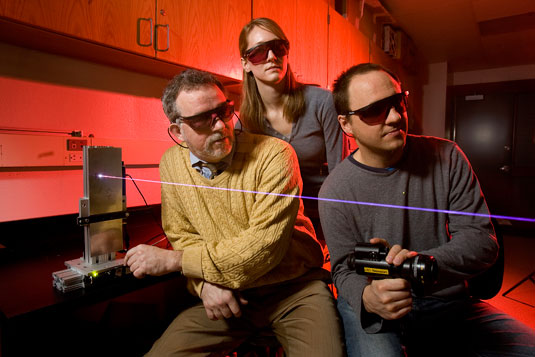For researchers, break is time of renewed focus

The classrooms and corridors of Temple’s academic buildings are a little less active, with final examinations ended and students gone home for winter break. But in nearby laboratories, Temple investigators and their staff remain in full motion, working throughout the holidays on projects that drive a major urban research university.
Many research faculty members will remain on campus throughout the break — as will their post-doc, graduate and some undergraduate students — to take advantage of the relative quiet and focus on ongoing projects with fewer outside interruptions.
“When classes are not in session, this is when we typically get most of our research done, because you can focus on the research, interact with each other on a daily basis and work on things for long stretches without any interruptions,” said Joseph Picone, chair of Electrical and Computer Engineering in the College of Engineering, whose software-based research group is working on speech recognition technology.
Picone said that the end of the calendar year is typically a busy time in his field, as researchers work to generate results in preparation for upcoming conferences and workshops.
Robert Levis, director of the Center for Advanced Photonics Research and chair of Chemistry in the College of Science and Technology, agreed that the lack of interruptions makes the holiday break an ideal time to conduct experiments and work on writing manuscripts on research findings. Like most researchers, Levis and his center must meet the expectations of funding agencies, which don’t operate on an academic calendar.
“There’s no provision in the grant awards that states you get two weeks off over the semester break,” said Levis.
Kamel Khalili, chair of Neuroscience and director of the Center for Neurovirology in the School of Medicine, agrees. Pausing or shutting down a project for even a few days could create an unacceptable delay, he said.
“After stopping for a week, it can take up to a week of preparation upon returning to the lab to get the experiments up and running again.
“We are working with cells and very important cell cultures that need to be constantly maintained,” he added. “Depending on the experimental protocols we are working with, specimens may need to be checked every 24-48 hours.”
Administrators who support Temple’s research enterprise will be busy as well. Robert Gage, director of sponsored research programs in the Office of Research Administration, noted that the office must meet proposal submission deadlines immediately before and after the holiday break, including a Jan. 5 submission deadline for NIH funding.
“The volume of work in our office doesn’t decrease over the holidays,” said Gage. “It stays consistent for us throughout the year.”